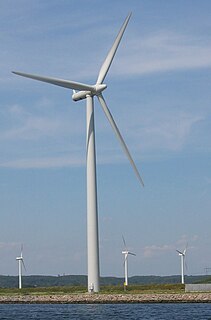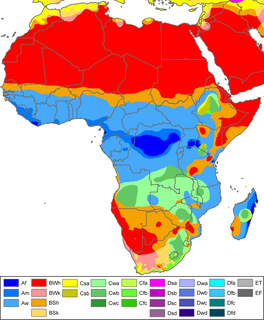Related Research Articles
Environmental finance is a field within finance that employs market-based environmental policy instruments to improve the ecological impact of investment strategies. The primary objective of environmental finance is to regress the negative impacts of climate change through pricing and trading schemes.The field of environmental finance was established in response to the poor management of economic crises by government bodies globally. Environmental finance aims to reallocate a businesses resources to improve the sustainability of investments whilst also retaining profit margins.

The Haas School of Business is the business school of the University of California, Berkeley. The first of its kind to be founded at a public university in the United States, it is ranked among the best business schools in the world by The Economist, Financial Times, QS World University Rankings, U.S. News & World Report, and Bloomberg Businessweek.

Sustainable energy is energy produced and used in such a way that it "meets the needs of the present without compromising the ability of future generations to meet their own needs."

Environmental consulting is often a form of compliance consulting, in which the consultant ensures that the client maintains an appropriate measure of compliance with environmental regulations. There are many types of environmental consultants, but the two main groups are those who enter the field from the industry side, and those who enter the field from the environmentalist side.

A carbon offset is a reduction in emissions of carbon dioxide or other greenhouse gases made in order to compensate for emissions made elsewhere. Offsets are measured in tonnes of carbon dioxide-equivalent (CO2e). One tonne of carbon offset represents the reduction of one tonne of carbon dioxide or its equivalent in other greenhouse gases.
Business action on climate change includes a range of activities relating to global warming, and to influencing political decisions on global-warming-related regulation, such as the Kyoto Protocol. Major multinationals have played and to some extent continue to play a significant role in the politics of global warming, especially in the United States, through lobbying of government and funding of global warming deniers. Business also plays a key role in the mitigation of global warming, through decisions to invest in researching and implementing new energy technologies and energy efficiency measures.

Sustainable cities, urban sustainability, or eco-city is a city designed with consideration for social, economic, environmental impact, and resilient habitat for existing populations, without compromising the ability of future generations to experience the same. The UN Sustainable Development Goal 11 defines sustainable cities as those that are dedicated to achieving green sustainability, social sustainability and economic sustainability. They are committed to doing so by enabling opportunities for all through a design focused on inclusivity as well as maintaining a sustainable economic growth. The focus also includes minimizing required inputs of energy, water, and food, and drastically reducing waste, output of heat, air pollution – CO
2, methane, and water pollution. Richard Register first coined the term "ecocity" in his 1987 book Ecocity Berkeley: Building Cities for a Healthy Future, where he offers innovative city planning solutions that would work anywhere. Other leading figures who envisioned sustainable cities are architect Paul F Downton, who later founded the company Ecopolis Pty Ltd, as well as authors Timothy Beatley and Steffen Lehmann, who have written extensively on the subject. The field of industrial ecology is sometimes used in planning these cities.
Carbon accounting or Greenhouse gas accounting refers generally to processes undertaken to "measure" amounts of carbon dioxide equivalents emitted by an entity. It is used by states, corporations and individuals to create the carbon credit commodity traded on carbon markets. Correspondingly, examples for products based upon forms of carbon accounting can be found in national inventories, corporate environmental reports or carbon footprint calculators. Likening sustainability measurement, as an instance of ecological modernisation discourses and policy, carbon accounting is hoped to provide a factual ground for carbon-related decision-making. However, social scientific studies of accounting challenge this hope, pointing to the socially constructed character of carbon conversion factors which cannot implement abstract accounting schemes into reality.
A low-carbon economy (LCE), low-fossil-fuel economy (LFFE), or decarbonised economy is an economy based on low-carbon power sources that therefore has a minimal output of greenhouse gas (GHG) emissions into the atmosphere, specifically carbon dioxide. GHG emissions due to anthropogenic (human) activity are the dominant cause of observed global warming since the mid-20th century. Continued emission of greenhouse gases may cause long-lasting changes around the world, increasing the likelihood of severe, pervasive, and irreversible effects for people and ecosystems.
Energy Saving Trust (EST) is a British organization devoted to promoting energy efficiency, energy conservation, and the sustainable use of energy, thereby reducing carbon dioxide emissions and helping to prevent man-made climate change. It was founded in the United Kingdom as a government-sponsored initiative in 1992, following the global Earth Summit.

Mark Diesendorf is an Australian academic and environmentalist, known for his work in sustainable development and renewable energy. He currently teaches environmental studies at the University of New South Wales, Australia. He was formerly professor of environmental science and founding director of the Institute for Sustainable Futures at the University of Technology, Sydney and before that a principal research scientist with CSIRO, where he was involved in early research on integrating wind power into electricity grids. His most recent book is Sustainable Energy Solutions for Climate Change.

Green electricity in the United Kingdom. There are a number of suppliers offering green electricity in the United Kingdom. In theory these types of tariffs help to lower carbon dioxide emissions by increasing consumer demand for green electricity and encouraging more renewable energy plant to be built. Since Ofgem's 2014 regulations there are now set criteria defining what can be classified as a green source product. As well as holding sufficient guarantee of origin certificates to cover the electricity sold to consumers, suppliers are also required to show additionality by contributing to wider environmental and low carbon funds.

Mark Kenneth Jaccard is a professor of sustainable energy in the School of Resource and Environmental Management (REM) at Simon Fraser University. He develops and applies models that assess sustainability policies for energy and material.
The Renewable Fuels Agency (RFA) was a UK Government non-departmental public body, created by the Department for Transport to implement the Renewable Transport Fuel Obligation or RTFO. The Agency ceased to exist at midnight on 31 March 2011 The Renewable Fuels Agency (RFA) was the UK’s independent sustainable fuels regulator. The agency awards Renewable Transport Fuel Certificates (RTFCs) to suppliers of biofuels in the UK, ensures companies meet their annual obligations and runs the RTFO’s carbon and sustainability reporting system.
This page is an index of sustainability articles.
Beyond Zero Emissions (BZE) is an Australia-based, internationally recognised climate change solutions think-tank. The organization is known for its work in producing independent and innovative research solutions which demonstrate that Australia can thrive through a transition to a zero emissions economy. BZE reports provide detailed pathways for a rapid transition in each major sector of Australia’s economy.
Universities all around the world have always had a leadership role in their respective communities by demonstrating the type of changes that need to occur with respect to timely issues that arise. In recent times, educational institutions are reporting greenhouse emissions as a means to measure sustainability. To become carbon neutral, universities are working to reduce their emissions of greenhouse gases, cut their use of energy, use more renewable energy, and emphasize the importance of sustainable energy sources. Universities that have committed to becoming carbon neutral have recognized the threat of global warming and are therefore committing to reverse the trend.

The Franz Edelman Award for Achievement in Operations Research and the Management Sciences recognizes excellence in the execution of operations research on the organizational level.

Renewable energy in Mexico contributes to 26 percent of electricity generation in Mexico. As of 2009, electricity generation from renewable energy comes from hydro power, geothermal, solar power and wind. There is a long term effort established to increase the use of renewable energy sources. The amount of geothermal energy used and harvested, places Mexico as number four in the world.

Climate change has highly impacted South Africa, primarily due to increased temperatures and rainfall variability. Evidence shows that extreme weather events are becoming more prominent due to climate change. This is a critical concern for South Africans as climate change will affect the overall status and wellbeing of the country, for example with regards to water resources. Just like many other parts of the world, climate research showed that the real challenge in South Africa was more related to environmental issues more than developmental ones. The most severe effect will be targeting the water supply, which has huge effects on the agriculture sector. Speedy environmental changes are resulting clear effects on the community and environmental level in different ways and aspects, starting with air quality, to temperature and weather patterns, reaching out to food security and disease burden.
